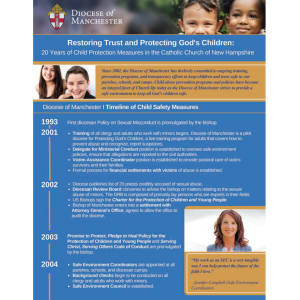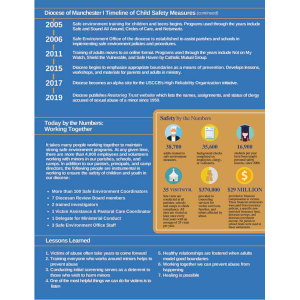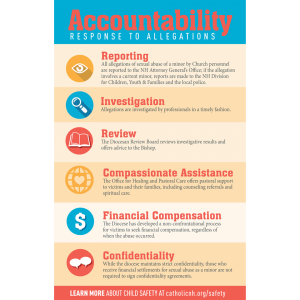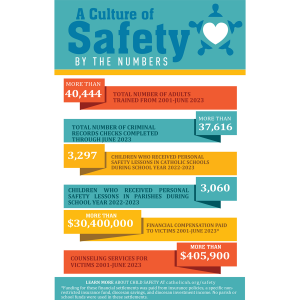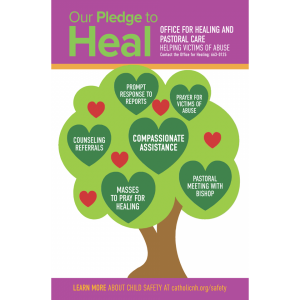Restoring Trust - Diocese of Manchester
Restoring Trust
Welcome
Welcome to the Diocese of Manchester Restoring Trust website. This website was established in 2019 by Bishop Peter Libasci to provide further transparency and as part of the Diocese’s ongoing efforts to provide outreach and assistance to those who have been harmed. Here you will find a list of the names and assignment histories of priests who have been accused of sexual abuse of a minor since 1950, as well as frequently asked questions and a variety of resources for victim-survivors, their families, and the general public.
The entire Body of Christ has suffered as a result of the sexual abuse of our most vulnerable members. We can never cease in praying for the innumerable victim-survivors and their family members. To that end, prayer resources can be found here.
Since 2002, the Diocese of Manchester has engaged in numerous restorative and prevention efforts aimed at ensuring a safe environment for minors and vulnerable persons. These efforts are summarized in our 2022 Special Report, which was issued in 2022 to recognize the 20th anniversary of the Charter for the Protection of Children.
These ongoing initiatives represent a dramatic shift from a culture of silence and lack of awareness about sexual abuse to one of awareness and transparency. We are proud of these efforts but also commit to striving for constant improvement.
Thank you for visiting the Restoring Trust website of the Diocese of Manchester.
04/10/24
Diocese of Manchester Adds to List of Clergy Accused of Sexual Abuse of a Minor
07/31/19
Bishop Libasci's Letter to the Faithful - English | Spanish
On the topic of publishing names of priests accused of sexual abuse of a minor
06/03/19
Bishop Libasci's Letter to the Faithful - English | Spanish
On the topic of the Church's efforts to protect children and vulnerable adults
02/05/19
Bishop Libasci's Letter to the Faithful - English | Spanish
Following the Bishops' Retreat at Mundelein Seminary
11/19/18
Bishop Libasci's Letter to the Faithful - English | Spanish
On the topic of the General Assembly of United States Conference of Catholic Bishops in Baltimore
10/10/18
Bishop Libasci's Letter to the Faithful - English | Spanish
On the topic of Archbishop McCarrick and Pennsylvania Grand Jury Report
List of names of accused priests:
The Diocese of Manchester has compiled a list of the names of priests of the diocese who have been accused of sexual abuse of a minor since 1950. To review the list, CLICK HERE.
F.A.Q.
Frequently Asked Questions Regarding
List of Priests Accused of Sexual Abuse of a Minor Since 1950
To date, the Diocese of Manchester has not received any reports of sexual abuse of a minor by a permanent deacon that meet the criteria set forth herein.
Click on the questions below for more information.
Since 2002, the Diocese of Manchester has notified the New Hampshire Attorney General’s office about all reports of sexual abuse of a minor by Church personnel (bishops, priests, deacons, employees, and volunteers), regardless of when the abuse occurred and regardless of whether there was any evidence to support the reports. In addition, the Diocese has periodically issued public notices regarding priests accused of sexual abuse of a minor. In 2019, after broad consultation with his advisors, Bishop Peter Libasci decided to publish on the diocesan website a comprehensive list of priests accused of sexual abuse of a minor since 1950 in an effort to help foster the process of healing and restoration of trust in the Church. This list also serves to notify the public about accused priests with cases concluded under Church law to help address any risk to children that they may currently pose.
The list was compiled in 2019 after a thorough review of all files of priests by two retired police detectives. The list also was reviewed by the Diocesan Review Board, a consultative committee including a pastor, a person experienced in the treatment of sexual abuse of a minor, and other lay persons who advise the Bishop in the assessment of complaints of child sexual abuse and on policy matters relating to the protection of children.
No. All of the priests identified on the list are either deceased, returned to the lay state, or prohibited from public ministry as a priest.
The term “sexual abuse” is contact of a sexual nature that occurs between a minor (a person under the age of 18) and an adult. “Sexual abuse” includes any act constituting sexual abuse under New Hampshire law and includes the acquisition, possession, or distribution of pornographic images of minors by whatever means or using whatever technology. Sexual abuse of a minor is a grave delict (a serious crime) against the Sixth Commandment under the 1983 Code of Canon Law and the Essential Norms.
This list does not include the names of priests accused of sexual misconduct involving an adult (i.e., an individual over the age of 18). The decision was made to focus the list on conduct that is a crime under civil and canon law.
Priests who have been “laicized” no longer have any rights or obligations of Holy Orders (for example, most sacraments), and the Diocese of Manchester no longer has any obligations of sustenance or support, or any responsibility of oversight toward that cleric.
Priests who have admitted to having sexually abused a minor may be “sentenced” by the Holy See in Rome to a life of “prayer and penance” if they are not suited for dismissal due to their age or infirmity. Priests assigned to a life of prayer and penance are permanently restricted from all forms of public ministry and may not wear clerical attire or publicly identify themselves as priests.
Priests who are “absent from ministry” and "prohibited from ministry" also are restricted from all forms of public ministry and may not wear clerical attire or publicly identify themselves as priests.
Yes. All of the priests on the list have been reported to the civil authorities. Since 2002, the Diocese of Manchester reports all allegations of sexual abuse of a minor involving church personnel (bishops, priests, deacons, lay employees, volunteers) to the New Hampshire Attorney General’s office regardless of when the abuse occurred and regardless of whether the accused person is living or in ministry.
One of the goals with respect to making this list available is to encourage survivors to report what happened to them so that the Diocese can have the opportunity to assist them in healing. The date of 1950 was selected with a focus on those survivors who may still be living, and to reflect the availability of historic files that might contain information about reports of abuse.
Yes. In February 2002, the New Hampshire Office of the Attorney General initiated a criminal investigation into the conduct of the Diocese of Manchester and its bishops and leaders regarding the manner in which the Diocese responded to allegations of sexual abuse of a minor by priests. The Attorney General’s office and the Diocese of Manchester entered into an agreement in December 2002 to resolve the investigation. The agreement provided that the Attorney General’s office would release to the public its investigative file, which the Attorney General’s office did in March 2003. In addition, the agreement provided, among other things, for mandatory reporting to the Attorney General’s office (which the Diocese continues), annual audits for a period of five years, and a diocesan office for handling matters involving sexual abuse of minors. The audit reports were made public and were posted to the website of the New Hampshire Department of Justice.
The following are among the steps the Diocese has taken since the early 2000’s to prevent sexual abuse of a minor:
All clergy and all employees and volunteers who regularly work with minors are required to complete sexual abuse awareness training and to undergo a criminal records check. Training and screening renewals are completed every 4 years. The training currently in use is called Safe Haven and may be found here. As part of this training, adults learn about the warning signs of abuse and are informed of their obligations under civil law and diocesan policy to report suspected abuse to the appropriate civil and Church authorities.
On an annual basis, all children enrolled in parish and school religious education programs are provided with a personal safety lesson through the Circles of Care and Netsmartz programs. The Diocese offers resources to parents about how to talk to their children about abuse and how to prevent and report abuse.
Every parish, school, and camp has a Safe Environment Coordinator who works with staff and volunteers to ensure that the above safe environment requirements are met. Safe Environment Coordinators also ensure that posters, reporting cards, and other materials are displayed at their locations.
Staff of the diocesan Safe Environment Office make regular visits to all parishes, schools, and camps in order to provide training to coordinators and ensure that the safe environment requirements are properly implemented. The Diocese has developed a “Safe Environment Database” accessible by Safe Environment Coordinators in order to track compliance by clergy, religious, and lay employees and volunteers. The diocesan Office for Ministerial Conduct has also developed many resources and materials for adults and children to raise awareness about abuse and appropriate boundaries in ministry, how to prevent abuse, and how to make reports of abuse and misconduct to law enforcement and the Church.
For more information, please visit our website.
Religious order priests, sisters, and brothers and priests incardinated in other dioceses answer to their own religious superior or bishop; therefore, the Diocese of Manchester often does not have sufficient information or authorization to conduct an investigation. For example, the Diocese of Manchester likely would not have the authority to access the personnel file of a member of a religious order. The Diocese made the decision to include on the list allegations of which it is aware against religious order priests or priests of other dioceses who were assigned by the Bishop of Manchester to ministry, as the Diocese has some basic information about the priest’s ministry in the diocese.
A report that you made may not have met the criteria for the list (i.e., sexual abuse of a minor by a priest of the Diocese of Manchester or by a religious order or priest of another diocese assigned by the Bishop of Manchester to ministry in New Hampshire). It is also possible that your report was investigated or reviewed, and it was determined after the review that the report was not supported by sufficient evidence to establish the probability that the accused cleric had sexually abused a minor. If you have questions about why your report is not included on the list, please contact the Diocese of Manchester’s Coordinator of Victim Assistance and Pastoral Care, Marc Guillemette, at (603) 663-0125 or healing@rcbm.org.
Yes. The Diocese of Manchester will update the list if or when it becomes aware of other reports that meet the criteria for the list.
The Diocese of Manchester has conducted a thorough review of its files and has checked and double-checked its records. However, it is possible that either the list contains errors or that we do not have records of certain reports, particularly if they were made many years ago. If you think that there are errors in the list, please contact the Bishop’s Delegate for Ministerial Conduct, James Kinney at (603) 663-0128 or delegate@rcbm.org.
Sacraments administered by priests on the list are considered to be valid, as long as the priest was validly ordained at the time.
If you or anyone you know has been sexually abused as a minor by a bishop, priest, deacon, or Church employee or volunteer, we encourage you to report the abuse to local law enforcement. If the abused person is still a minor, the report is made to the New Hampshire Division for Children, Youth & Families (“DCYF”) at (800) 894-5533. To report your abuse to the Church, please contact the Diocese of Manchester’s Coordinator of Victim Assistance and Pastoral Care, Marc Guillemette, at (603) 663-0125 or healing@rcbm.org.
If you are a member of the clergy or a Church employee or volunteer and suspect that a current minor has been sexually abused by a bishop, priest, deacon, or Church employee or volunteer, you must report your suspicions to:
- DCYF: (800) 894-5533 and
- Local law enforcement and
- The Bishop’s Delegate for Ministerial Conduct: delegate@rcbm.org or (603) 663-0128.
After receiving a report of sexual abuse of a minor by a priest, and after attempting to obtain as much information as possible from the reporting party, the Diocese reports the matter to the Division for Children, Youth and Families, local law enforcement, and the New Hampshire Attorney General’s office (if the victim is a minor) or to the Attorney General’s office (if the victim no longer is a minor). The Diocese cooperates with the civil authorities in their investigation of the report.
If the report involves a priest in ministry, the accusation is plausible (has the “semblance of truth”), and doing so does not interfere with any police investigation, the priest is immediately removed from ministry, pending an investigation. The Director of the Office for Healing and Pastoral Care offers outreach and assistance to the victim-survivor and his or her family (see below). If doing so does not interfere with the police investigation, the Diocese retains a professional investigator to conduct an investigation of the report.
Once the investigation is complete, the report and all relevant documentation are shared with the Diocesan Review Board, which examines all the available evidence before advising the bishop on a recommended determination.
No priest who has been found to have sexually abused a minor is eligible for ministry in the Diocese of Manchester.
The Diocese's Coordinator of Victim Assistance and Pastoral Care offers support and assistance to victims, survivors, and their families in an accepting, caring, and compassionate manner. The support offered by the Coordinator of Victim Assistance and Pastoral Care includes:
- Providing prompt, compassionate, professional response and follow-up to persons who make reports and to their family and friends;
- Offering referrals for counseling services and pastoral care;
- Facilitating pastoral interviews with the Bishop of Manchester; and
- Counseling services, provided by a therapist of an individual's own choice, are funded by the Diocese on a time-limited basis with the goal of providing therapeutic support to complement other efforts toward healing and wholeness. The Diocese has established standards for reimbursement to ensure an individual's counseling toward healing. When requested, individuals are offered assistance in their search for a licensed mental health professional and/or for a qualified person who can provide pastoral and spiritual care.
The Coordinator of Victim Assistance and Pastoral Care may be reached at healing@rcbm.org or (603) 663-0125.
In addition, the Diocese has developed a process for victims and survivors of sexual abuse as minors by diocesan priests to apply to the Diocese for financial assistance. Information about this process may be obtained through the Office of the Bishop’s Delegate for Ministerial Conduct. James Kinney, Bishop’s Delegate for Ministerial Conduct, may be reached at delegate@rcbm.org or (603) 663-0128.
Please visit our website for resources for parents and concerned adults about how to prevent abuse and keep children safe.
The Diocese of Manchester has provided over $30.4 million in financial compensation. In addition, the Diocese has paid over $405,900 for counseling services.
Funding for financial settlements has come from insurance policies, a specific non-restricted insurance fund, diocesan savings, and diocesan investment income. No parish or school funds were used in these settlements nor can they be used to fund any related claim against the Diocese. In accordance with the civil legal structure of the Diocese and Church law, no parish or school assets, including savings and real estate, may be used to fund claims against the Diocese.
All priests assigned to ministry in the Diocese of Manchester have completed child abuse awareness training and are required to complete refresher training at least once every four years. All have undergone criminal records checks, which are also updated every four years. Non-diocesan priests who assist in our parishes, schools, and institutions are held to the same standards and also must present evidence that they are in good standing in their sending diocese or community. No priest who has admitted or been found to have sexually abused a minor may serve in the Diocese of Manchester in any capacity.
As Catholics, we turn to Christ’s words and examples to guide us. Christ calls us to:
Pray: Prayer is the foundation of our daily life. Pray for the victims, survivors, and their families, pray for our clergy, and pray to the Blessed Mother, asking her to guide the Church and provide comfort and healing to those who were harmed.
Take Action: There are many actions that we can take to help comfort victims and survivors and combat abuse in the Church and society. For example:
- Educate yourself about child abuse and how to prevent it by completing our diocesan Safe Haven training;
- Teach your children about personal safety;
- Report any concerns you have about abuse of a minor to the New Hampshire Division for Children, Youth & Families (“DCYF”) at (800) 894-5533 (if a current minor) and law enforcement, and report any concerns about boundary violations in parish or school ministry to the Delegate for Ministerial Conduct (603-663-0128);
- Ask what you can do to assist with safe environment efforts at your parish or school;
- Volunteer to work at a community agency dedicated to individuals who have experienced violence and sexual abuse;
- Incorporate prayer for victims and survivors into existing parish prayer groups or Eucharistic Adoration through the Cry to Heaven prayer program.

